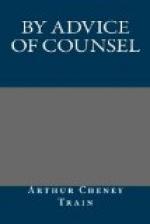“And now about the will!” chirped Tutt, as after a labored encomium upon the virtues of Payson, Senior, deceased, he took the liberty of lighting a cigarette before he commenced to read the instrument which lay in a brown envelope upon the desk before him. “And now about the will! I suppose you are already aware that your father has made you his executor and, after a few minor legacies, the residuary legatee of his entire estate?”
Payson shook his head mutely. He felt it more becoming to pretend to be ignorant of these things under the circumstances.
“Yes,” continued Tutt cheerfully, taking up the envelope, “Mr. Tutt drew the will—nearly fifteen years ago—and your father never thought necessary to change it. It’s lain right there in our ‘Will Box’ without being disturbed more than once,—and that was seven or eight years ago when he came in one day and asked to be allowed to look at it,—I think he put an envelope containing a letter in with it. I found one there the other day.”
Payson languidly took the will in his hand.
“How large an estate did he leave?” he inquired.
“As near as I can figure out about seventy thousand dollars,” answered Tutt. “But the transfer tax will not be heavy, and the legacies do not aggregate more than ten thousand.”
The instrument was a short one,—drawn with all Mr. Tutt’s ability for compression—and filling only a single sheet. Payson’s father had bequeathed seventy-six hundred dollars to his three cousins and their children, and everything else he had left to his son. Payson rapidly computed that after settling the bills against the estate, including that of Tutt & Tutt, he would probably get at least sixty thousand out of it. At the current rate he would continue to be quite comfortable,—more so in fact than heretofore. Still, it was less than he had expected. Perhaps his father had had expensive habits.
“Here’s the letter,” went on Tutt, handing it to Payson who took out his pen-knife to open it the more neatly. “Probably a suggestion as to the disposal of personal effects—remembrances or something of the sort. It’s often done.”
The envelope was a cheap one, ornamented in the upper left hand corner with a wood cut showing a stout goddess in a night dress, evidently meant for Proserpina—pouring a Niagara of grain out of a cornucopia of plenty over a farmland stacked high with apples, corn, and pumpkins, and flooded by the beams of a rising sun with a real face. Beneath were the words:
“If not delivered in five days return to
Clifford, Cobb & Weng, Grain Dealers and Produce 597 Water Street, N.Y. City, N.Y.”
Even as his eye fell upon it Payson was conscious of its coarse vulgarity. And “Weng”! Whoever heard of such a name? He certainly had not,—hadn’t even known that his father had a partner with such an absurd cognomen! “—& Weng!” There was something terribly plebeian about it. As well as about the obvious desire for symmetry which had led to the addition of that superfluous “N.Y.” below the entirely adequate “N.Y. City.” But, of course, he’d be glad to do anything his father requested in a letter.




